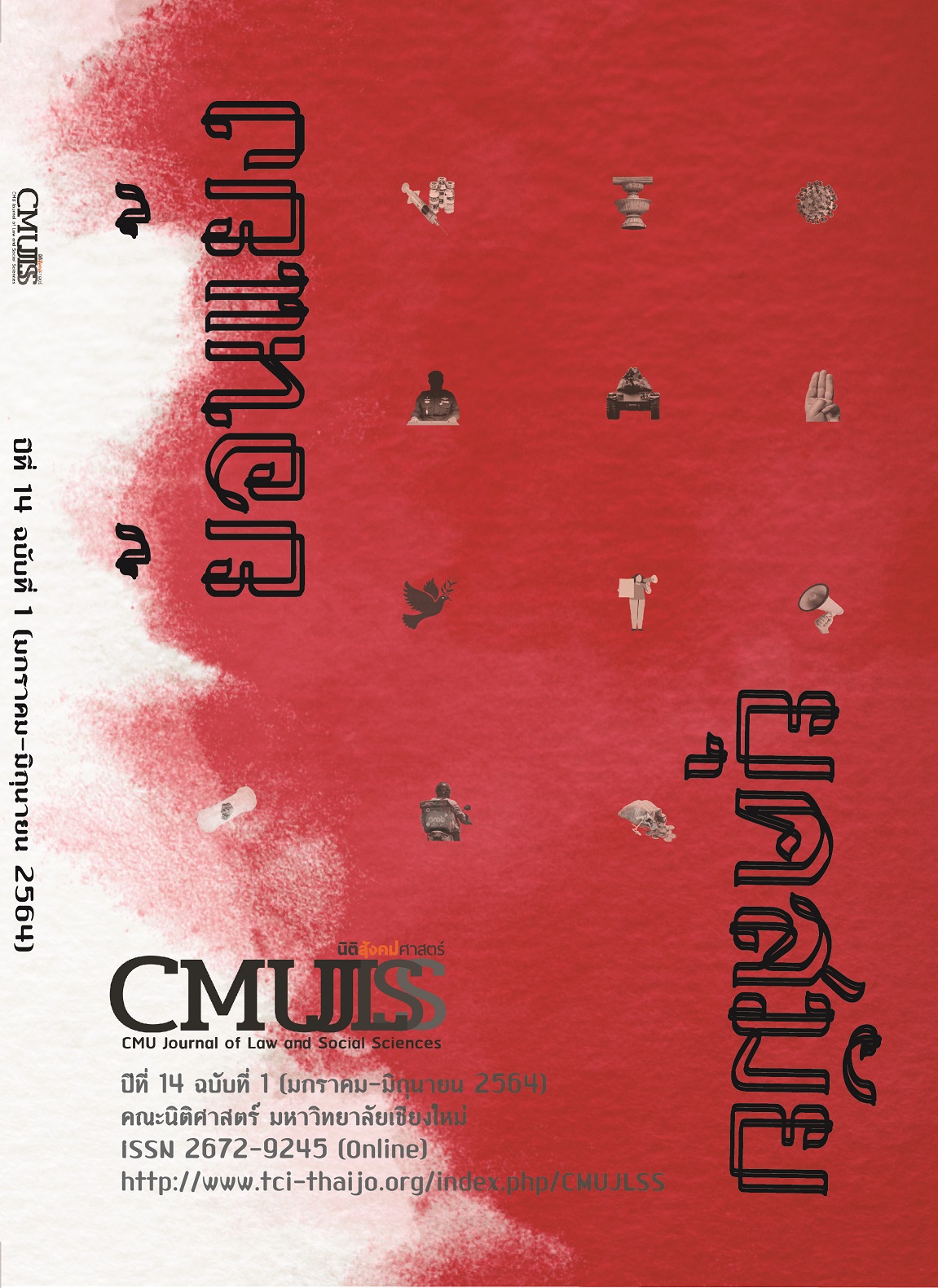ภาษีผ้าอนามัย: ความท้าทายด้านสิทธิสตรี
Main Article Content
บทคัดย่อ
การมีประจำเดือนถือเป็นเรื่องธรรมชาติที่เด็กผู้หญิงและสตรีจะต้องเผชิญในชีวิตประจำวัน ซึ่งโดยเฉลี่ยแล้วประจำเดือนของเด็กผู้หญิงและสตรีจะมาในทุกๆ 28 วันเสมอ การเข้าถึงผลิตภัณฑ์สุขอนามัยประจำเดือน พื้นที่ส่วนตัวสำหรับเปลี่ยนผลิตภัณฑ์สุขอนามัยประจำเดือน ห้องน้ำที่เหมาะสม น้ำสะอาดและถังขยะถูกสุขลักษณะ ล้วนแล้วแต่เป็นสิทธิในการจัดการตนเองของเด็กผู้หญิงและสตรีในขณะที่มีประจำเดือน โดยมุ่งหวังให้เด็กผู้หญิงและสตรีทุกคนไม่ได้รับความอับอายในขณะที่อยู่ในช่วงเวลาที่มีประจำเดือนหรือไม่มีรอยซึมเปื้อนจากการที่ประจำเดือนเลอะออกมา อย่างไรก็ตามภาษีผลิตภัณฑ์สุขอนามัยประจำเดือน (หรือเรียกว่าภาษีผ้าอนามัย) อาจเป็นต้นเหตุที่ก่อให้เกิดอุปสรรคต่อการเข้าถึงผลิตภัณฑ์สุขอนามัยประจำเดือนเพราะผลิตภัณฑ์สุขอนามัยประจำเดือนในท้องตลาดมีราคาแพง อีกทั้งอุปสรรคเช่นว่านี้ย่อมส่งผลกระทบต่อกลุ่มเด็กผู้หญิงและสตรีที่ไม่มีฐานะทางเศรษฐกิจเพียงพอจะซื้อผลิตภัณฑ์สุขอนามัยประจำเดือนมาใช้งานในชีวิตประจำวันได้ บทความวิชาการฉบับนี้มุ่งค้นคว้าผลจากนโยบายภาษีผ้าอนามัยและการดำเนินนโยบายยกเลิกภาษีผ้าอนามัย บทความวิชาการฉบับนี้ยังมุ่งอธิบายรายละเอียดเกี่ยวกับนโยบายภาษีผ้าอนามัย รวมไปถึงผลสะท้อนที่เกิดขึ้นจากการดำเนินนโยบายดังกล่าว โดยเฉพาะอย่างยิ่งการศึกษาวิเคราะห์ตัวอย่างจากบางประเทศที่ดำเนินนโยบายยกเลิกภาษีผ้าอนามัย ผ่านการศึกษาวิเคราะห์ผลกระทบจากการดำเนินนโยบายยกเลิกภาษีผ้าอนามัยดังกล่าว
Article Details
O ความคิดเห็นใดๆ ที่ลงตีพิมพ์ใน CMU Journal of Law and Social Sciences เป็นของผู้เขียน (ความคิดเห็นใดๆ ของผู้เขียน กองบรรณาธิการ CMU Journal of Law and Social Sciences ไม่จำเป็นต้องเห็นด้วย)
O กองบรรณาธิการ CMU Journal of Law and Social Sciences ไม่สงวนสิทธิ์ในการคัดลอกแต่ให้อ้างอิงแหล่งที่มาด้วย
เอกสารอ้างอิง
Bennett, Jennifer. “The Tampon Tax: Sales Tax, Menstrual Hygiene Products, and Necessity Exemptions.” Business, Entrepreneurship & Tax Law Review 1, no.1 (2017).
Birmingham City Council. Tackling Period Poverty and Raising Period Awareness: A report from Overview & Scrutiny. Birmingham, UK: Birmingham City Council, 2019.
Canadian Menstruators. “About the campaign the history of battle for tax fairness.” Accessed January 19, 2021 http://www.canadianmenstruators.ca/
Cardoso, F. lauren, Scolese, M. Anna, Hamidaddin, Alzahra. et al. “Period poverty and mental health implications among college-aged women in the United States.” BMC Women's Health 21, no.14 (2021).
Community Food Initiatives North East. ‘Improving Access to Sanitary Products’ CFINE’s Pilot Project Report. Aberdeen, UK : Community Food Initiatives North East, 2018.
Community Foundation Wales. Fund Criteria: Tampon Tax Community Fund. Cardiff, UK: Community Foundation Wales., 2019.
Corlet, Adam. The shifting shape of UK tax: Charting the changing size and shape of the UK tax system. London: Resolution Foundation, 2019.
Corte Constitucional de Colombia. “Sentencia C-117/18.” Accessed January 22, 2021 https://www.corteconstitucional.gov.co/relatoria/2018/C-117-18.htm
Corte Constitucional de Colombia. “Sentencia T-398/19.” Accessed January 22, 2021 https://www.corteconstitucional.gov.co/relatoria/2019/T-398-19.htm
Crawford, J. Bridget & Spivack, Carla. “Tampon Taxes, Discrimination, and Human Rights.” Wisconsin Law Review. 3, (2017).
Department for Digital, Culture, Media & Sport. Tampon Tax Fund 2018/19 - Guidance for applicants. London: Department for Digital, Culture, Media & Sport, 2018.
Dickson, Courtney. “Toronto group petitions against tax on tampons.” Accessed January 20, 2021 https://nowtoronto.com/toronto-group-petitions-against-tax-on-tampons
Do, Christina, Hodgson, Helen. & Wilson-Rogers, Nicole. “The Tax on Feminine Hygiene Products: Is This Reasonable Policy?.” Australian Tax Forum 32, no.3 (2017).
UDC David A. Clarke School of Law. Periods, Poverty, and the Need for Policy: A Report on Menstrual Inequality in the United States. Washington, DC: UDC David A. Clarke School of Law, 2018.
Habbal, H. Hajar. “An Economic Analysis of The Pink Tax.” BA Thesis., Lake Forest College, 2020.
Hartman, Victoria. “End the Bloody Taxation: Seeing Red on the Unconstitutional Tax on Tampons.” Northwestern University Law Review 112, no.2 (2017).
Jurga, Ina, Yates, Marc & Bage, Sarah. Period Tax: Advocacy Guide Version July 2020. Berlin: WASH United gGmbH, 2020.
Kaeding, Nicole. “Tampon Taxes: Do Feminine Hygiene Products Deserve a Sales Tax Exemption?.” Fiscal Fact 156, no. 547 (April 2017): 1-6.
Krenz, Astrid & Strulik, Holger. Menstruation hygiene ma
nagement and work attendance in a developing country, cege Discussion Papers, No. 364. Göttingen: University of Göttingen, 2019.
Lennon, M. A proposal for a Bill to ensure free access to sanity products, including in schools, colleges and universities. Edinburgh: Scottish Parliament, 2017.
Office of the High Commissioner for Human Rights. Menstrual Hygiene and the Human Rights to Water and Sanitation. Geneva: Office of the High Commissioner for Human Rights, (2003).
Office of the High Commissioner for Human Rights. Women’s Rights are Human Rights. Geneva: Office of the High Commissioner for Human Rights, (2014).
Olaya, A. Monica. “Blood, Taxes, and Equality.” Accessed February 11, 2021 https://ohrh.law.ox.ac.uk/blood-taxes-and-equality/
Ooi, Jorene. “Bleeding Women Dry: Tampon Taxes and Menstrual Inequity.” Northwestern University Law Review 113, no.1 (2018).
Tearfund. Sanitation and hygiene in developing countries: A case study from the Democratic Republic of Congo identifying and responding to barriers. Middlesex, UK: Tearfund, 2007.
Tellier, Siri & Hyttel, Maria. Menstrual Health Management in East and Southern Africa: a Review Paper. Johannesburg: United Nations Population Fund, East and Southern Africa Regional Office, 2017.
Tull, Kerina. Period poverty impact on the economic empowerment of women. Brighton, UK: Institute of Development Studies., 2019.
United Nations Children's Fund. Guide to Menstrual Hygiene Materials. New York, NY: United Nations Children's Fund, 2019.
Vermont Commission on Women. Info Sheet: Taxation of Feminine Hygiene Products in VT. Montpelier, VA: Vermont Commission on Women, 2017.
Ware, Jessica. “Tampon tax scrapped in Canada after petition convinces conservative government.” Accessed January 20, 2021 https://www.independent.co.uk/news/world/americas/tampon-tax-scrapped-canada-after-petition-convinces-conservative-government-10283929.html
Weckesser, Annalise, Williams, Gemma, Hewett, Angela & Amie, Randhawa. Best practice and innovations in period poverty and menstruation education initiatives. London: Plan International UK, 2020.
Weiss-Wolf, Jennifer. “U.S. Policymaking to Address Menstruation: Advancing an Equity Agenda.” William & Mary Journal of Women and the Law 25, no.2 (2019).
Welham, Bryn. Taxes and duties for sanitary products in Africa WOW Helpdesk Query 50. London, UK: UK Aid Direct, 2020.
William, Mariama. “Gender, Tax Reform and Taxation Cooperation Issues: Navigating Equity and Efficiency under Policy Constraints." Tax Cooperation Policy Briefs 156, no.9 (September 2019): 1-18.

